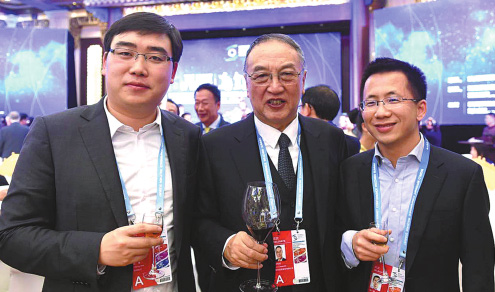 |
|
Cheng Wei (left), CEO of Didi Kuaidi, Liu Chuanzhi, founder and chairman of Lenovo, and Zhang Yiming, founder of Toutiao, attend the Second World Internet Conference in Wuzhen, Zhejiang province. [Photo provided to China Daily] |
Chinese enterprises in the picture have combined assets worth of more than $600 billion, surpassing their counterparts in Seattle worth $400 billion. It has been dubbed the "most expensive group photo in the history of China's Internet".
The picture has much information while leaving room for people's own interpretations-since there are more than 2,000 people attending the conference but only 84 shown in the photo.
Who is facing the flashlights and where they stand was apparently not decided randomly.
President Xi Jinping and foreign VIP guests took the first row; while the position of bosses from China's giant Internet companies radiate from the center of the second row backward and outward.
Prominently, company leaders from China's Internet big three, Baidu, Alibaba and Tencent (collectively nicknamed BAT), stand behind China's central government leaders.
Jack Ma, Alibaba Group executive chairman, Ma Huateng, founder and CEO of Tencent, and Li Yanhong, chairman and CEO of Baidu, occupied center spots of the second row.
Highly successful enterprise leaders, including Liu Chuanzhi, founder and chairman of Lenovo; and Zhang Ruimin, CEO of Haier; are on the flanks of the second row.
Other rising stars of China's Internet world, including the founders of Xiaomi, JD.com and Qihoo 360, are placed in the second and third rows.
The owner of Chinese major information portals Sina.com, Sohu.com and 163.com, stand in the third and fourth rows.
This photo includes representatives of almost all Chinese leading companies in every sector of the Internet.
Entrepreneurs of companies that are believed to be "pioneer leaders" and BAT have become synonymous with success, because of their massive size and ability to redefine the industry, beat their competitors one after another and keep expanding into other areas.
In addition, two other figures appear in the photo-two young company leaders both born in 1983.
One is Zhang Yiming, founder of Toutiao, a personalized news app; and the other is Cheng Wei, chief executive of cer of Didi Kuaidi, China's largest car-hailing service provider.
Coinciding with earlier media reports that new generation business leaders, including Cheng and Zhang, attended the summit, the appearance of the duo in the photo clearly states that younger Internet entrepreneurs are taking center stage.
Zhang, who is tech-savvy, created Toutiao to cater to different reader's habits and provide information tailor-made to individuals.
Since it went online in 2012, Toutiao said it has accumulated a pool of 35 million daily active users and 350 million registered users. The capital market predicts that the value of Toutiao is more than $5 billion.
Didi Kuaidi, which launched only three years ago, secured its latest round of financing in September and saw its estimated capital value soar to $16.5 billion.
Though the young entrepreneurs made their way to center stage for the photo, fashion critics said they need time to look more businesslike.
"Zhang's suit has too many fake pockets," Business Style, a privately-run popular social media outlet reported.
"The jacket is too short and the sleeves of the shirt are too long. He strapped his belt high (maybe he hopes this could make his legs looks longer), and the hue of his ties is too close to his shirt."
Zhang is more accustomed to wearing T-shirts that cost less than 100 yuan ($15.40), a style he believes to be very Silicon Valley.
New generation
Guangzhou-based think-tank Trigger Trend reported that "with Chinese Internet companies developing over the past 20 years, a trend that the younger generation is replacing the older generation is unfolding. Many entrepreneurs born in the 1980s have taken the spotlight."
Trigger Trend believes those entrepreneurs, including Zhang, are different in being more idealistic.
It said entrepreneurs from the older generation that was strapped by unfavorable conditions think survival is most important and how to make money is their biggest concern when starting businesses.
Things began to change when BAT emerged.
Li's Baidu made a difficult transformation to shift from providing a business to business search engine to a business to consumer model. Ma's Alibaba also experienced difficulties changing from providing paid service to free service.
In contrast, entrepreneurs of the new generation set up their goals and systems first, then find the resources needed to drive the business according to their optimal model.
The motto that "not making a profit is shameful" does not apply to them.
With support from venture capital, they can win market shares in the Internet world through subsidizing their users.
"The result of this is that new Chinese entrepreneurs think about how to change the world rather than making money, like their counterparts in Silicon Valley," Trigger Trend reported.
Another feature of next generation entrepreneurs is they are more willing to share, said the report.
They are confident and open to discussion.
They no longer follow a Wall Street business culture that revolves around a hierarchy system, but believe in Silicon Valley's culture that is built on equality and cares more about partnerships than employment relations.
The report said the young and idealistic entrepreneurs are therefore willing to share their benefits and power to streamline their companies to achieve their goals.
"Cheng Wei hired Liu Qing from Goldman Sachs while Zhang Yiming hired leaders from top media, leading Internet giants and Silicon Valley. Those moves dramatically improved the quality and development speed of their companies," the report said.
